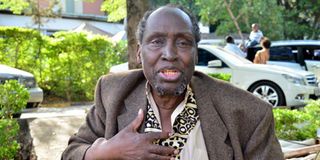Ngugi’s acceptance of Catalonia Prize was in Line with his language ideals

Author Ngugi wa Thiong'o gestures during an interview on February 7, 2019
What you need to know:
- Prof Indangasi raises two issues: Ngugi’s mistake of allowing himself to be used to advance a separatist agenda and using Gikuyu to address the world.
- Unlike Achebe’s case, the Catalonia government’s reason to award Ngugi coheres with his principles of defending African languages.
Writer Prof Ngugi wa Thiong’o was awarded the 31st Catalonia International Prize (Premi International Catalunya) on September 3, 2020 “for his distinguished and courageous literary work and his defence of African languages, based on the notion of language as culture and collective memory.”
Ngugi’s receipt of the prestigious prize was not a surprise; after all he has been touted several times to bag, arguably, the world’s most prestigious prize – the Nobel Prize for Literature. What amazed many was his decision to address the audience in his mother language – Gikuyu - despite there being none or a negligible audience who shared his mother language.
Since then, scholars have taken divergent opinions regarding to Ngugi’s choice of language, some applauding him for remaining true to his African roots with others castigating him for using his mother language where few, if any, could comprehend.
My attention was drawn by Prof Henry Indangasi’s article entitled “Why Ngugi should have rejected Catalonia Prize” (Saturday Nation, September 19, 2020). While responding to the good professor’s article, I must admit that I am not qualified to tie his shoe. I only come in as a literature aficionado for which the good professor is its overseer.
Separatist agenda
Prof Indangasi raises two issues: Ngugi’s mistake of allowing himself to be used to advance a separatist agenda and using Gikuyu to address the world.
Regarding Ngugi’s acceptance of a controversial prize, I opine that rejection and or acceptance of a prize is a matter of conscience. For instance, Chinua Achebe’s conscience could not allow him to accept the Nigerian honour Commander of the Federal Republic, which he declined twice in 2004 and 2011.
He felt that Eastern Nigeria occupied mainly by his tribe – Igbo – had been mistreated over the years. The Biafran war, which had his full support, sprang from this perceived mistreatment. To accept the prize would, therefore, amount to lack of principles.
Unlike Achebe’s case, the Catalonia government’s reason to award Ngugi coheres with his principles of defending African languages. He has been very passionate about the holistic preservation of African culture, African languages included.
He has demonstrated this by writing in his mother language for several decades. In my opinion, therefore, to reject the prize simply because it was offered by a regional government that is fighting to secede from Spain is tantamount to engaging in reverse gear, reversing his gains over the decades.
Acceptance speech
The second concern that the good Professor raises, and indeed many other scholars, is Ngugi’s use of Gikuyu language in his acceptance speech. He points out an apt example of 1980s where Ngugi, once more, addressed his audience in his mother language, prompting Lewis Nkosi, the South African writer, to ask him a question in his mother language, leading to a stalemate.
Before meeting and listening to Ngugi’s speech on February 22, 2019 at Kenyatta University, Kitui campus during an academic Conference-cum-International Mother Language Celebration Day, I had considered him a controversial writer who earns his living abroad and yet encourages us to write in our mother languages.
Through his speech, I got to understand what he stands for: learn other people’s language but also learn yours. He gave the example of his case – he is a professor of English at the University of California but also competent in his mother language.
When vacancies arise in his university, he is proud to out compete his work mates in their language. His motto is: learn and compete favourably in other people’s languages but equally learn your mother language to maintain your identity.
Let me get back to the good Professor’s argument. I wish to observe that the world of 1980s is different from the world of 2020. Technology has advanced. Most likely everybody in that meeting had a gadget to help them get an instant translation into their mother language.
We watched the speech over the TV and it had a translation running simultaneously. Thus Ngugi’s use of Gikuyu to address the audience is a win-win situation: preserving his language and culture as well as fully living the ideal that made him win the price.
Mutuku wa Muneeni teaches literature at Kenyatta University, Kitui Campus




